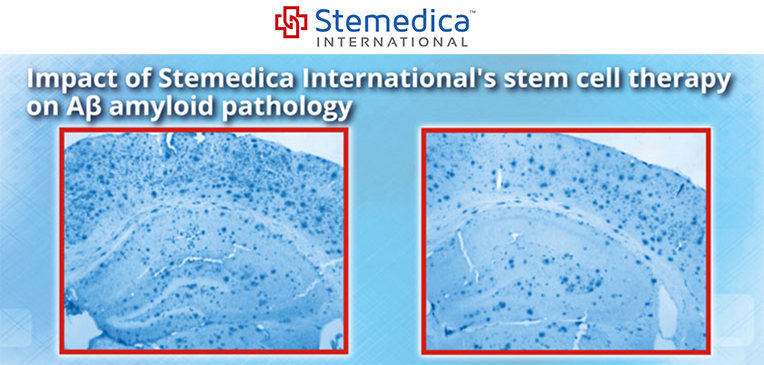Stemedica International, a Stemedica Cell Technologies Inc. subsidiary developing stem cell therapies for Alzheimer’s disease and dementia, revealed the first results of an intravenous administration of allogeneic, human, ischemia-tolerant mesenchymal stem cells (itMSCs) in a pre-clinical animal model of Alzheimer’s disease. The results demonstrated a greater than 30% decrease in amyloid beta (Abeta) plaques in the brain of transgenic animals treated with Stemedica itMSCs compared to the control group that were treated with lactated Ringer’s solution (LRS).
“Pre-clinical results show Stemedica International’s treatment reduces the amount of plaque as much as the best drug candidates to manage Abeta amyloidosis,” says Stemedica International’s Chief Scientist Tristan Bolmont. “Most importantly, our itMSC treatment did not result in side effects, such as cerebral amyloid angiopathy and micro-hemorrhages.”
These promising results were achieved during a two-year, intensive, pre-clinical research project supported by a grant from the Swiss Commission for Technology and Innovation (CTI). The research was conducted at the Laboratoire d’Optique Biomedicale and headed by Professor Theo Lasser at École Polytechnique Fédérale de Lausanne (EPFL) in Switzerland.
“The combination of safety and efficacy of Stemedica’s itMSCs clears the pathway for Stemedica International to file an IND application with the FDA for clinical trials,” says Stemedica International’s General Manager Alexei Lukashev. “We hope our stem cell treatment can halt or slow down the progression of Alzheimer’s disease and, maybe, have some reverse effect on the damage caused by Alzheimer’s disease and other forms of dementia, which the Alzheimer’s Disease Institute estimates afflicts more than 44 million people worldwide today.”
Only Stemedica International’s therapies feature itMSCs that are exclusively licensed from the parent company Stemedica Cell Technologies, Inc. Unlike other MSCs – which are grown under normoxic conditions – Stemedica’s bone-marrow-derived, allogeneic itMSCs are unique because they are grown under hypoxic conditions. In vitro experiments demonstrate cells that are exposed to hypoxic conditions show greater homing and engraftment than cells grown under normoxic conditions. Compared to other MSCs, itMSCs secrete higher levels of growth factors and other important proteins associated with neoangiogenesis and healing.





